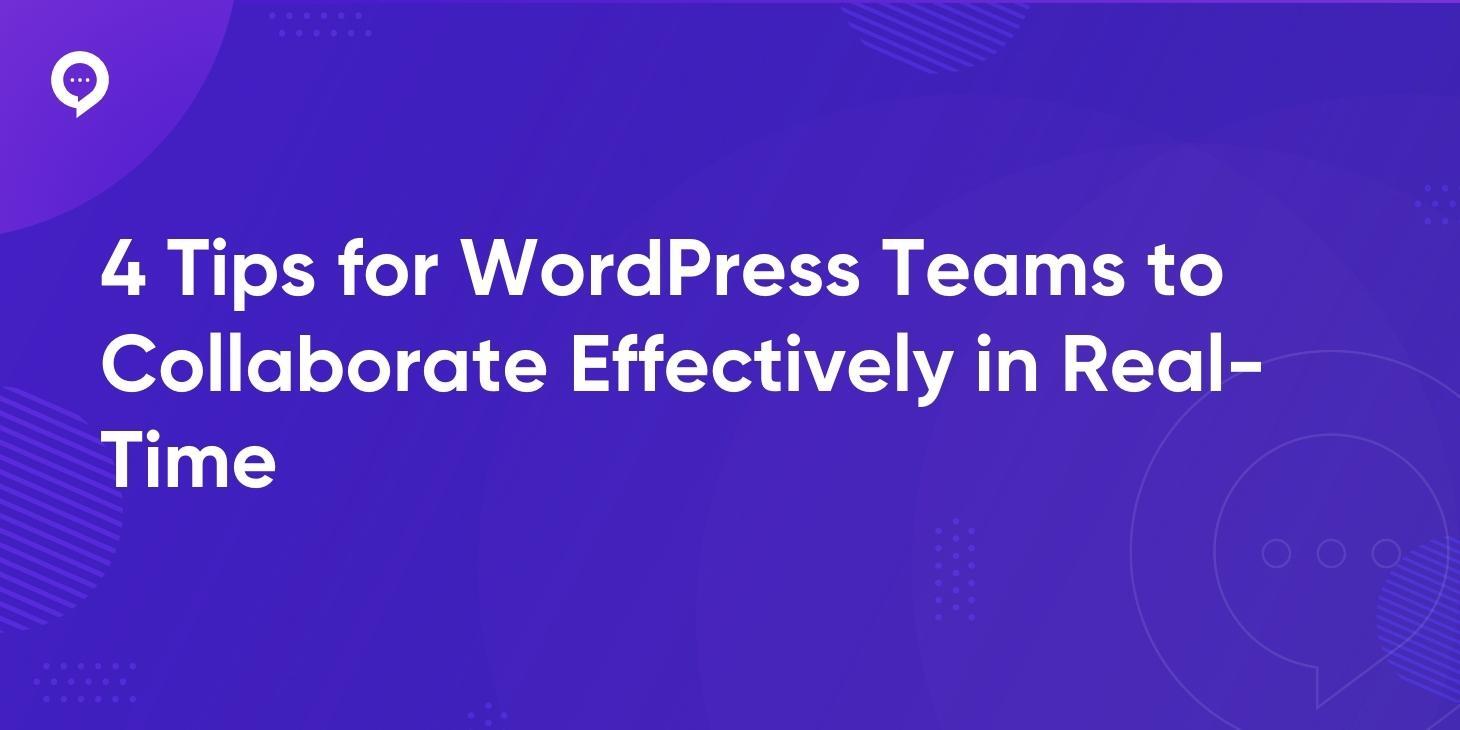Table of Contents
In the realm of content creation, seamless collaboration isn’t just a bonus, it’s a necessity. When a WordPress team communicates effectively, the flow of ideas is smooth, ultimately translating into stellar content that truly connects with the audience.
Picture this: authors, editors, and other stakeholders are actively engaged in the Gutenberg blog editor, working as a unit to shape a piece of content — from ideation through to finalization. This, in essence, is effective real-time collaboration within WordPress teams.
It revolutionizes the content creation workflow, enhancing both efficiency and satisfaction.
In this article, let’s look at four tips that will boost your WordPress team’s content creation workflow via adept real-time collaboration.
1. Establish Clear Roles and Responsibilities
The roles that bring a piece of content to life include authors who bring the initial idea to paper, editors who refine the raw content, and reviewers who ensure the content aligns with the brand and its audience. Then there are external stakeholders and clients who provide their valuable input, shaping the final piece.
Imagine a scenario where the distinction between roles isn’t quite clear. An editor might unknowingly step into the author’s shoes, making significant changes to the original idea. Meanwhile, the author, in the absence of clear guidelines, might also attempt to edit the piece, leading to a duplication of effort.
The flow of information could become disjointed, causing potential leaks and misunderstandings.
By defining and assigning specific roles and tasks, we can mitigate these issues. For instance, let’s consider a WordPress content team working on a blog post. If each member knows their role – the author to write, the editor to refine, and the reviewer to validate – the process becomes streamlined.
This well-orchestrated flow of tasks not only avoids duplication but also ensures that each member can focus on their specific area of expertise.
Moreover, clarity in roles directly translates into enhanced productivity in real-time collaboration. Continuing with our blog post example, if each member of the team knows their responsibilities, they can work simultaneously on the Gutenberg editor.
While the author drafts the initial content, the editor can provide real-time feedback. The reviewer, on the other hand, can simultaneously check the content for brand alignment. Such effective collaboration, facilitated by Multicollab (more on this in the following section), can greatly reduce the time taken from ideation to publication, thus enhancing productivity.
2. Utilize a Real-Time Collaboration Tool
Although third-party real-time collaboration tools like Dropbox Paper and Microsoft Word get the job done, they pose certain challenges for WordPress teams.
One significant challenge is the back-and-forth transfer of content between these tools and the WordPress editor during the editorial and publishing phases. This additional step not only disrupts the workflow but also leaves room for errors.
Additionally, to receive feedback, teams often need to provide external stakeholders unrestricted access to their organizational drives, leading to potential data security risks. Furthermore, these tools are primarily text editors, meaning teams cannot efficiently exchange feedback on multimedia content like videos, or dynamic content like CTA boxes and image carousels.
Imagine the possibilities if WordPress teams could directly collaborate on the WordPress Gutenberg editor from ideation to publication. It would eliminate the need for constant content transfer, ensure data safety, and enable comprehensive feedback exchange.
This is precisely where a dedicated collaboration tool for WordPress steps in.
Multicollab is an effective real-time collaboration tool designed specifically for teams and authors who publish content on WordPress. Here are a few of its key features and benefits that will elevate your content creation process:
- Google Docs-style co-editing: This allows team members to work on the same content simultaneously, enhancing productivity and reducing the time from ideation to publication.
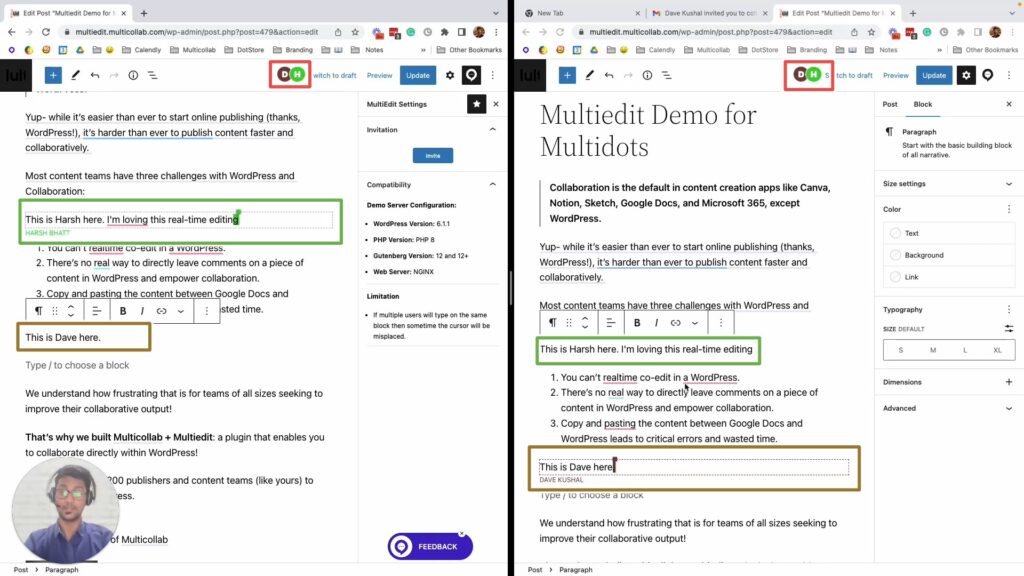
- Support for multimedia and dynamic content: Unlike traditional text editors, Multicollab allows teams to review and provide feedback on videos, CTA boxes, image carousels, and other dynamic content elements.
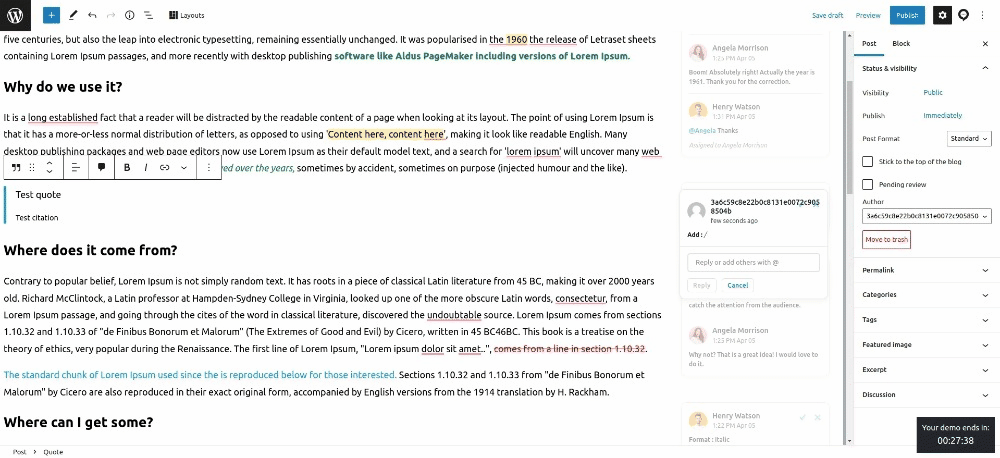
- Streamlined workflow: With Multicollab, everything happens within the Gutenberg editor, eliminating the need for multiple tools and creating a seamless content production process.
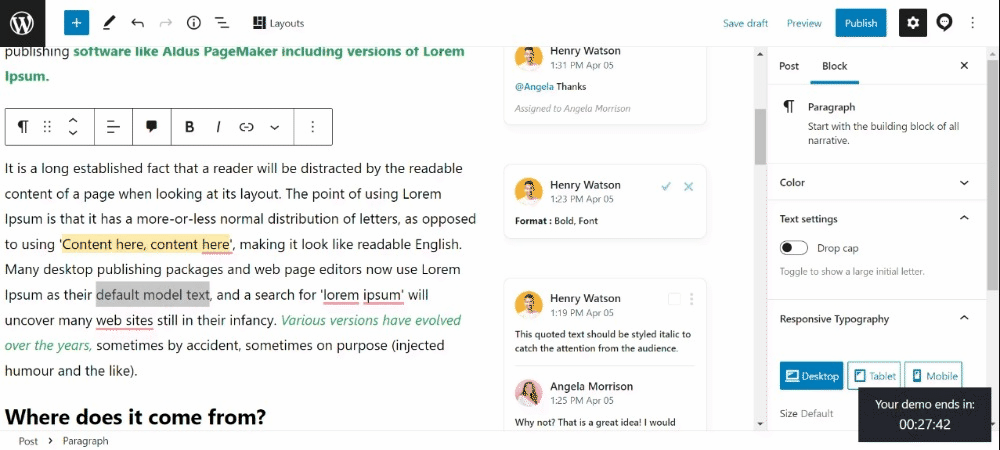
- Data security: Multicollab allows external stakeholders to provide feedback directly in the WordPress editor, ensuring your internal data remains secure. You can easily manage permissions and create custom roles with specific permissions if needed.
Start your journey towards effective real-time collaboration by trying Multicollab today.
3. Develop a WordPress Content Workflow
Having a structured content workflow is critical in a collaborative environment, especially when working with WordPress.
A well-defined workflow ensures a smooth content production process, eliminating bottlenecks and confusion among team members. It helps optimize resource consumption, as each team member knows exactly what their responsibilities are, reducing overlap and redundancy.
Lastly, a clear workflow boosts team morale by providing clarity and structure, reducing stress, and making collaboration more enjoyable.
Let’s explore a simple WordPress content production workflow, which you can refine and modify as per your team’s needs:
- Plan: This phase involves brainstorming ideas for the content. It’s where you decide what topics to write about, based on your audience’s interests, industry trends, and your brand’s objectives.
- Produce: Once you have a topic, it’s time to start crafting your content. Depending on your team’s structure, this could be done by one or more writers. After the content is written, it goes through a review process where other team members can give their feedback and suggestions. With a tool like Multicollab, you can do this right within the WordPress editor, making this step more efficient.
- Manage: In this phase, you ensure that the content piece is updated in terms of media and links. Furthermore, you also need to update the status of the draft to the rest of the team.
- Publish: After the content is approved, it’s ready to be published on your WordPress site. This is where your content finally goes live for your audience to read and engage with.
- Measure: You need to consistently monitor various content performance metrics such as dwell time and social shares to recalibrate your content production strategy.
Keep the following graphic handy while explaining this WordPress content production workflow to your team:
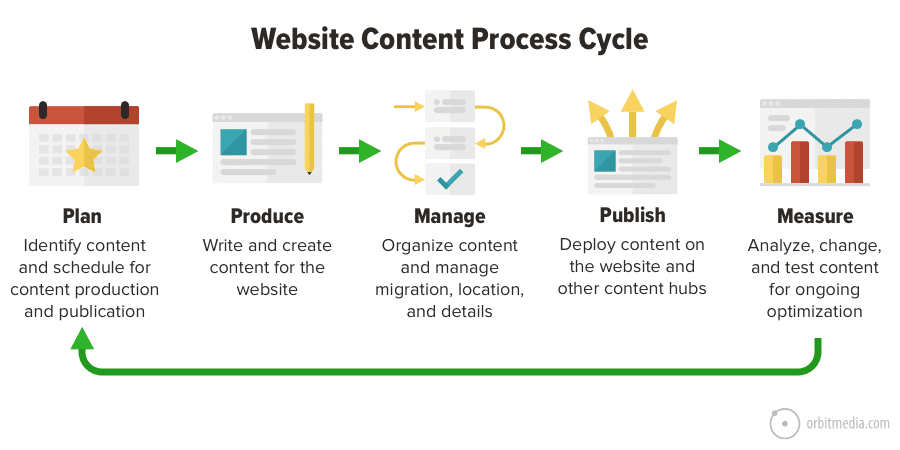
Remember, this workflow is just a starting point. Every team is different, and you may need to tweak this process to suit your specific needs and challenges. The key is to create a workflow that optimizes collaboration and productivity for your team.
4. Encourage Constructive Feedback
In a real-time collaborative environment, providing and receiving valuable feedback is integral to refining the content and ensuring it meets the desired objectives. Here are three ways that will help you exchange constructive feedback in a real-time collaborative environment in WordPress:
- Be Specific and Actionable: Consider a scenario where a team member receives feedback saying, “This section is not very engaging.” Such feedback is vague and leaves the receiver uncertain about what changes to make.
Instead, a more specific and actionable feedback like, “This section could be more engaging if we incorporated an interesting statistic or real-world example relevant to the topic,” provides clear direction on how to enhance the content. - Focus on the Content, Not the Person: Suppose a team member comments, “You always use too many technical terms in your writing.” This feedback is directed towards the individual, not the content, and can be perceived as a personal attack.
A more effective approach would be to say, “The use of fewer technical terms in this article could make it more accessible to our non-technical audience,” which is constructive and centered around improving the content. - Be Open to Feedback: Let’s imagine a team member who, upon receiving feedback, reacts defensively and dismisses the suggestions. This reaction not only hampers the individual’s growth but also disrupts the collaborative environment.
On the contrary, adopting an attitude like, “I appreciate your suggestion to add a real-world example here. It could indeed make the section more relatable for our readers,” shows openness to feedback and eagerness to enhance the content quality.
Conclusion
To elevate your WordPress team’s collaborative efforts, implement the following strategies:
- Establish Clear Roles and Responsibilities to prevent duplication of effort and streamline information flow. This can result in higher productivity and more effective real-time collaboration.
- Utilize a Real-Time Collaboration Tool like Multicollab, which can mitigate the challenges of using third-party tools and bring your entire content creation process within the WordPress Gutenberg editor.
- Develop a Structured WordPress Content Workflow to optimize resource utilization and improve content quality. A well-defined workflow can also boost the morale of your team by providing clear direction at every stage of content creation.
- Encourage Constructive Feedback within your team. Constructive, actionable feedback can lead to better content and a healthier, more collaborative work environment.
By implementing these tips, you’re setting up your team for success in the realm of effective real-time collaboration.
Multicollab, a WordPress collaboration plugin, can streamline your content production process. With features like real-time co-editing and secure feedback exchange, it’s designed to boost your team’s productivity while safeguarding your organizational data.
Transform your WordPress content production process and experience the power of effective, real-time collaboration with Multicollab today.
FAQs:
1. What are the five strategies for effective collaboration?
The five strategies for effective collaboration include establishing clear roles, using a real-time collaboration tool like Multicollab, developing a content workflow, encouraging constructive feedback, and maintaining a positive team culture.
2. What are the keys to effective collaboration?
The keys to effective collaboration are clear communication, defined roles and responsibilities, a structured workflow, constructive feedback, and the use of collaboration tools like Multicollab.
3. What are the 3 conditions for effective collaboration?
Effective collaboration hinges on clear communication, defined roles and responsibilities, and an open feedback culture. Utilizing a real-time collaboration tool like Multicollab can aid in fostering these conditions within a WordPress content team.


